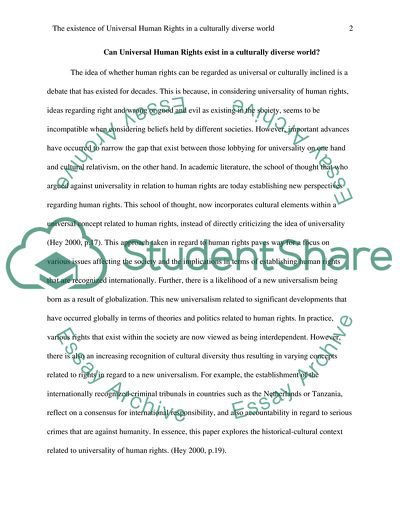Cite this document
(Can Universal Human Rights Exist in a Culturally Diverse World Literature review Example | Topics and Well Written Essays - 2750 words - 1, n.d.)
Can Universal Human Rights Exist in a Culturally Diverse World Literature review Example | Topics and Well Written Essays - 2750 words - 1. https://studentshare.org/sociology/1805098-critically-discuss-the-historical-cultural-context-of-human-rights-does-their-context-differ-across-cultural-boundaries-and-if-so-does-this-speak-against-their-universalisation
Can Universal Human Rights Exist in a Culturally Diverse World Literature review Example | Topics and Well Written Essays - 2750 words - 1. https://studentshare.org/sociology/1805098-critically-discuss-the-historical-cultural-context-of-human-rights-does-their-context-differ-across-cultural-boundaries-and-if-so-does-this-speak-against-their-universalisation
(Can Universal Human Rights Exist in a Culturally Diverse World Literature Review Example | Topics and Well Written Essays - 2750 Words - 1)
Can Universal Human Rights Exist in a Culturally Diverse World Literature Review Example | Topics and Well Written Essays - 2750 Words - 1. https://studentshare.org/sociology/1805098-critically-discuss-the-historical-cultural-context-of-human-rights-does-their-context-differ-across-cultural-boundaries-and-if-so-does-this-speak-against-their-universalisation.
Can Universal Human Rights Exist in a Culturally Diverse World Literature Review Example | Topics and Well Written Essays - 2750 Words - 1. https://studentshare.org/sociology/1805098-critically-discuss-the-historical-cultural-context-of-human-rights-does-their-context-differ-across-cultural-boundaries-and-if-so-does-this-speak-against-their-universalisation.
“Can Universal Human Rights Exist in a Culturally Diverse World Literature Review Example | Topics and Well Written Essays - 2750 Words - 1”. https://studentshare.org/sociology/1805098-critically-discuss-the-historical-cultural-context-of-human-rights-does-their-context-differ-across-cultural-boundaries-and-if-so-does-this-speak-against-their-universalisation.


